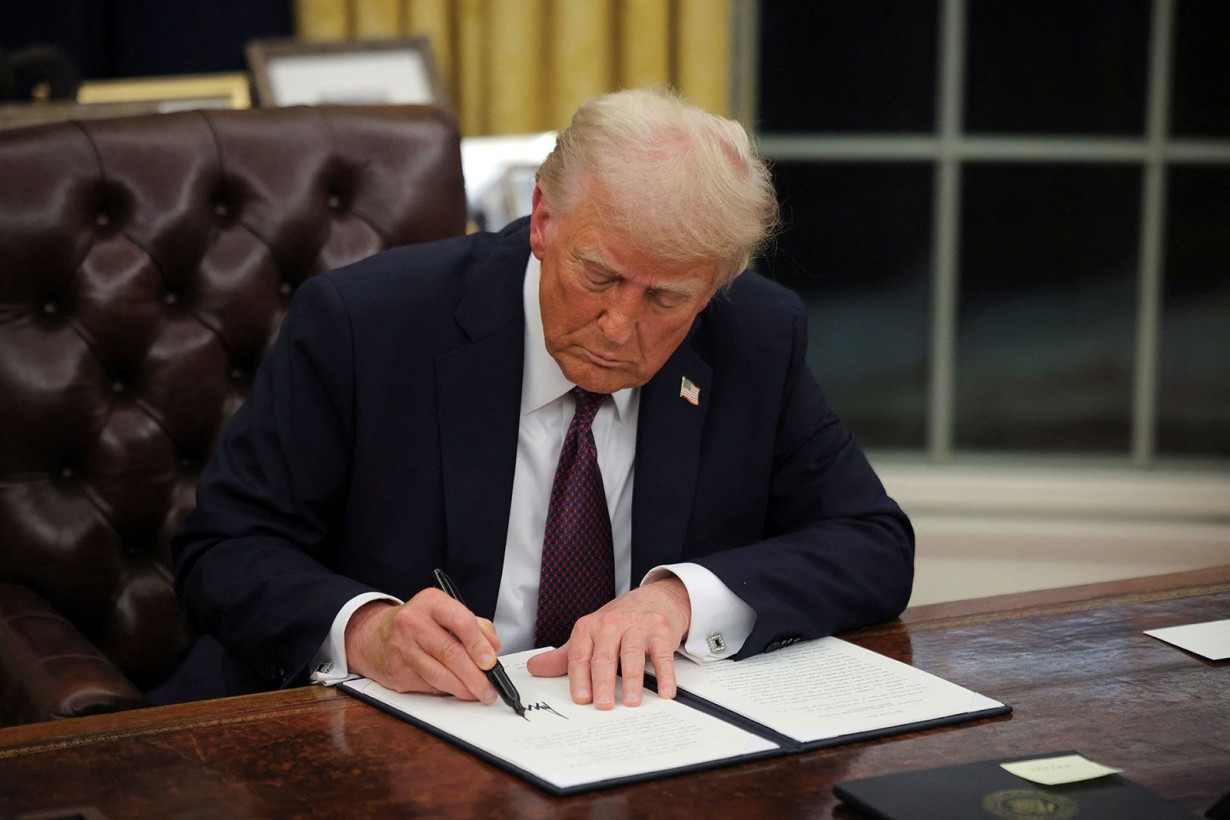(CNN) — It may not be as oft-quoted as the First Amendment or as contested as the Second Amendment, but the 14th Amendment to the United States Constitution plays a critical role in supporting some of our closest-held notions of American freedom and equality.
For one, it clearly states that American citizenship is a birthright for all people who are born on American soil — something that President Donald Trump has announced he wants to end. Not only would this unravel 150 years of American law, it would loosen a significant cornerstone of the Constitution’s interpretation of American identity.
In order to better understand this part of the 14th Amendment, we turned to a pair of experts in constitutional and immigration law: Jeffrey Rosen, president and CEO of the National Constitution Center; and Erika Lee, former director of the Immigration History Research Center at the University of Minnesota.
The amendment has five sections, but we will only be dealing with the first, which contains the Citizenship Clause and three other related clauses.
But first, some history
The 14th Amendment is known as a Reconstruction amendment, because it was added to the Constitution after the Civil War in 1868. That places it at an important historical crossroads, when lingering wounds of divisiveness and animosity still plagued the nation and the reality of a post-slavery America begged contentious racial and social questions.
“Thomas Jefferson said men were created equal, but the original Constitution betrayed that promise by allowing for slavery,” says Jeffrey Rosen. “The 13th, 14th and 15th amendments were designed to enshrine Lincoln’s promise of a new America.”
The amendment’s first section begins:
However, as so often is the case, this reaffirmed American ideal fell short of reality. Rosen notes that issues of civil rights and equal treatment continued to be denied to African Americans, LGBT people and other citizens for more than a century after the amendment’s ratification.
And Erika Lee points out that Native Americans weren’t even allowed to become citizens until 1925.
“Even as (these amendments) were written, obviously there were major built-in inequalities and maybe at the time weren’t intended to apply to everyone,” Lee says.
Why was citizenship by birthright such an important concept?
“Citizenship was a central question left open by the original Constitution,” says Rosen. “At the time it was written, the Constitution assumed citizenship, but it didn’t provide any rules for it. In the infamous Dred Scott decision, the Chief Justice said African Americans can’t be citizens of the US and ‘had no rights which the white man was bound to respect.’”
The US Supreme Court’s ruling in the Dred Scott case, named for a slave who unsuccessfully sued for his freedom, has since been widely condemned.
“The 14th Amendment was designed to overturn this decision and define citizenship once and for all, and it was based on birthright,” Rosen says. “It is really important that it’s a vision of citizenship based on land rather than blood. It is an idea that anyone can be an American if they commit themselves to our Constitutional values.”
What does it mean to be ‘subject to the jurisdiction thereof?’
According to Rosen, this is one of the greatest questions of citizenship. There are two clear examples of people not subject to the jurisdictions of the United States: diplomats and their children, and – at the time of the 14th Amendment – Native Americans, who were not recognized as part of the American populace.
“With those two exceptions, everyone who was physically present in the United States was thought to be under its jurisdiction,” Rosen says. “There are numerous Supreme Court cases that reaffirm that understanding, and almost as importantly, there are lots of congressional statutes that assume birthright citizenship.”
Some scholars, like John Eastman of the Claremont Institute’s Center for Constitutional Jurisprudence, have argued that children of undocumented immigrants are not “subject to the jurisdiction” of the US and thus should not be considered citizens under the Constitution.
But Rosen says this is a minority view among constitutional scholars of all political backgrounds.
“While the Supreme Court has not explicitly ruled (on the issue of children of undocumented immigrants), Congress has passed all kinds of laws presuming their citizenship,” Rosen says.
What is the connection between birthright citizenship and immigration?
In 1898, 30 years after the 14th Amendment was adopted, the Supreme Court reached a defining decision in a case known as the United States v. Wong Kim Ark. Lee explains that Wong Kim Ark was the American-born son of Chinese immigrants.
“Asian immigrants were the first immigrants to the US that couldn’t be considered white,” Lee says. “So they are treated differently. They are taxed differently, they are stripped of many rights. In the 1880s, they are excluded from immigration and barred from citizenship.”
So, the main question of the case was, could a person born in America be a citizen in a place where his parents could not be as well? The Supreme Court decided yes, and the case remains the first defining legal decision made under the banner of birthright citizenship.
“(The Supreme Court’s decision) said that the right of citizenship is not a matter of inheritance, that it never descends from generation to generation, it is related to where you’re born,” Lee says. “It’s about the power of place. That has been a very expansive, and at the time, a corrective measure to a more exclusionary definition both legally as well as culturally as to what an American is.”
Why must it be stated that the privileges of citizenship need to be protected?
Before the Civil War, states didn’t necessarily have to follow the provisions stated in the Bill of Rights; only Congress had to. The 14th Amendment changed that.
“This second sentence of the Amendment means that states have to respect the Bill of Rights as well as basic civil rights and the rights that come along with citizenship,” Rosen says. “The idea was that there were rights that were so basic; so integral to citizenship that they could not be narrowed by the states.”
Despite the promises and protections of citizenship, Lee says it is abundantly clear that different racial groups were, and often are, seen as unable or unworthy to function as true American citizens. After all, basic rights of citizenship, like suffrage and equal treatment, were denied certain racial groups for a hundred years after the 14th Amendment.
“The idea of a law applying to ‘all people’ seems to be clear. But in reality, the debate and the laws and practices that get established are very much based on a hierarchy of, well sure, all persons, but some are more fit and some are more deserving than others,” she says.
Throughout history, Asian immigrants, Mexican immigrants, Muslim immigrants and their children, to name a few, have had unspoken cultural caveats applied to their ability to be Americans.
“For Asian immigrants, the racial argument at the time was that ‘It didn’t matter whether one were born in the US or not, Asians as a race, are unassimilable. They are diametrically opposite from us Americans,’” Lee says.
“That was the argument that was used to intern Japanese citizens. It was the denial of citizenship in favor of race: ‘The ability to become American, the ability to assimilate, they just didn’t have it.’”
Why was it important to legalize rights for non-citizens?
So far, we’ve covered the first clause, the Citizenship Clause, and the second, the Privileges and Immunities Clause. These both deal with American citizens.
The final two clauses, the Due Process Clause and the Equal Protection clause, are a little different, and deal with the rights of all people in the United States.
Eagle-eyed Constitution readers will notice that the 14th Amendment contains a “due process” clause very similar to the Fifth Amendment. This, says Rosen, was a technical addition to ensure the Fifth Amendment wasn’t theoretically narrowed down to protect only American citizens.
“The 14th Amendment distinguishes between the privileges of citizenship and the privileges of all people,” Rosen says. “The framers (of the amendment) thought there were certain rights that were so important that they should be extended to all persons, and in order to specify that they needed a new ‘due process’ clause.”
What does it mean to have ‘equal protection of the laws’?
“At the time following the Civil War, at its core, it meant all persons had the right to be protected by the police, that the laws of the country should protect all people,” Rosen says.
“In the 20th century, more broader questions were litigated under the 14th Amendment, like Brown v. Board of Education — whether segregation was constitutional. Cases involving the internment of Japanese citizens, case from the marriage equality decisions, even Roe vs. Wade have strains of equal protection language and invoke due process law.”
Another interesting case that speaks directly to the immigration side of the 14th Amendment debate is the 1982 case of Plyler v. Doe, in which the Supreme Court ruled it was unconstitutional for the state of Texas to deny funding for undocumented immigrant children.
Why are we talking about all this right now?
Trump signed a flurry of executive actions Monday on his first day back in the White House, including ending birthright citizenship. Because the right is enshrined in the Constitution, any change would need to be addressed via a constitutional amendment or the courts.
But Trump’s interest in repealing birthright citizenship isn’t a new idea. He mentioned it seven years ago, during his first term. And Lee says for the last 30 years or so, there have been several overtures by the political right to explore “citizenship reform,” a timeline that she says aligns with the ascendancy of modern American conservatism.
Lee fears if the current push to end birthright citizenship is successful, it could have wider implications than most people assume. People from other countries who are here legally on work or student visas, for instance, could have children who do not legally belong to the only country they know.
“There have been attempts since the 1990s to break away birthright citizenship, or narrow it down, and it did not seem that they would have a chance at succeeding until now,” she says.
“To me this not only reflects the ascendancy of an extreme right position but also a return to a very narrow and exclusionary definition of Americanness.”
CNN’s Brandon Griggs contributed to this story.
The-CNN-Wire
™ & © 2025 Cable News Network, Inc., a Warner Bros. Discovery Company. All rights reserved.

 Trump has begun another trade war. Here's a timeline of how we got here
Trump has begun another trade war. Here's a timeline of how we got here
 Canada's leader laments lost friendship with US in town that sheltered stranded Americans after 9/11
Canada's leader laments lost friendship with US in town that sheltered stranded Americans after 9/11
 Chinese EV giant BYD's fourth-quarter profit leaps 73%
Chinese EV giant BYD's fourth-quarter profit leaps 73%
 You're an American in another land? Prepare to talk about the why and how of Trump 2.0
You're an American in another land? Prepare to talk about the why and how of Trump 2.0
 Chalk talk: Star power, top teams and No. 5 seeds headline the women's March Madness Sweet 16
Chalk talk: Star power, top teams and No. 5 seeds headline the women's March Madness Sweet 16
 Purdue returns to Sweet 16 with 76-62 win over McNeese in March Madness
Purdue returns to Sweet 16 with 76-62 win over McNeese in March Madness








